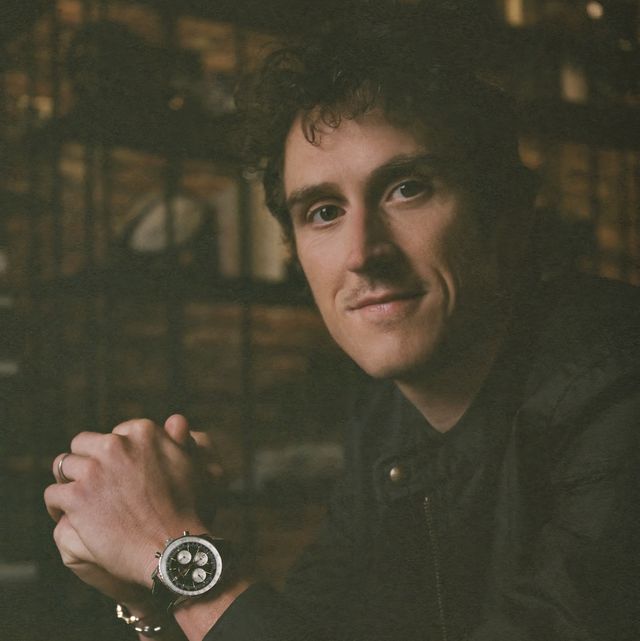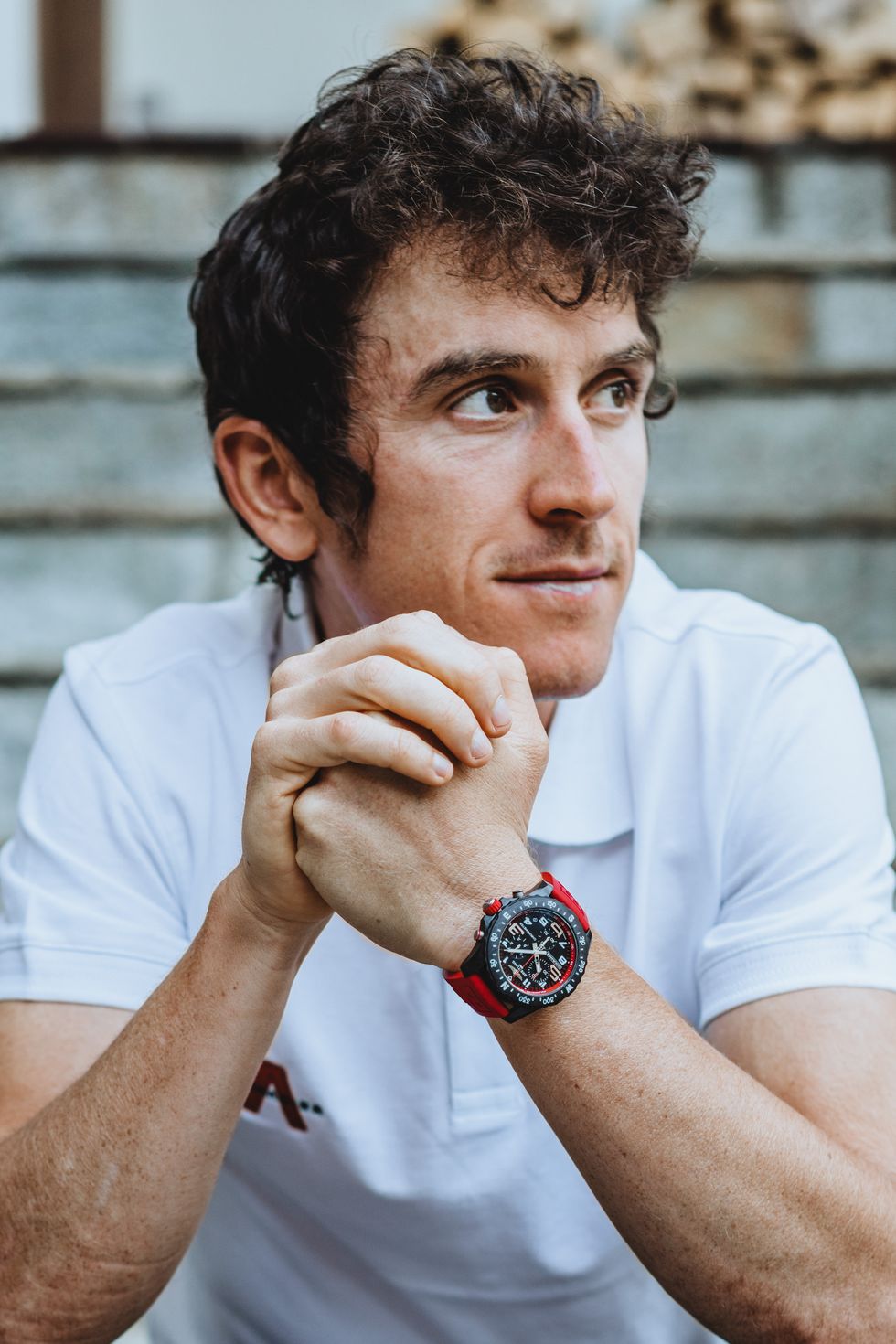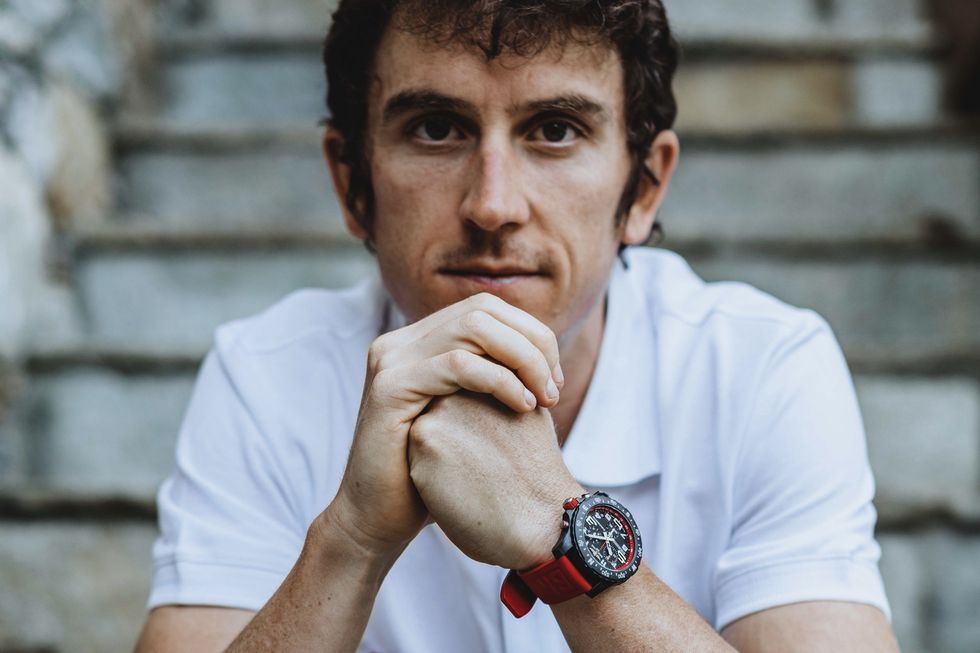You’d think that riding for your life over three weeks, 21 stages and 85-and-a-half-hours on the road, only to be pipped by 14 seconds at the last, would be pretty gutting. And, to be fair, the recent Giro d’Italia result does still sting Geraint Thomas a touch.
“I'd been leading the race for so long and been in a good position for so long, but then on the last day like that…”
Still, he’s been racing too long to take it too deeply. “Obviously I would've loved to have finished it off, but that's what makes cycling and sport all the more enjoyable, isn't it?
Now 37 and still at the top of cycling, the 2018 Tour de France winner has come a long way from the outdoor velodrome at his local leisure centre in Cardiff, Maindy Stadium. “Just a kid's club, you know: no brakes and one gear. And so it just went along for that, enjoyed it, made some friends there and that was it.”
“If you told me back then that I would've come second in the Giro at one point, I probably would've bit your hand off and been totally surprised that I’d be gutted coming second.”
He’s not riding the Tour this year, but he’ll be back for the Vuelta e Espana in late August. Today we’re chatting about Breitling, for whom he’s an ambassador. He likes a Chronomat (“it’s classy and understated – not in your face but really elegant”) and how Breitling “understand the power of individual brilliance coming together collectively to create something beautiful”.
Thomas has a lot else going on besides cycling, not least his very enjoyably unguarded Geraint Thomas Cycling Club podcast with best pal and fellow pro Luke Rowe and amateur Tom Fordyce. He can see why some riders are minded to keep their true feelings to themselves and keep their heads down. “But nobody wants that,” he says. “Me and Luke always just try to say what we think and just be honest.”
Does his sport draw particular character types to it? He pauses. “I think,” he says, “you’ve gotta be a bit tapped in the head to be a cyclist.”
What’s the atmosphere like among riders during a Tour de France stage?
Yeah, every race is different. Obviously the Tour is the biggest race in the world and everyone's stressed about it – it's like a world championship every day. The media, the fans, everything is tenfold. Whereas in the Giro and the Vuelta it’s definitely a lot more chilled around the race.
Dan Martin, who rode the Tour de France nine times, once told me that when he finished his first Tour he swore he’d never, ever do it again.
You are always super glad to finish it, that's for sure, and to get through it. No matter where you finish, you're pretty wasted at the end. But within a week or so, you kind of like, Oh, that was actually quite good, and you kind of did enjoy it and you’re looking forward to the next one already. The first week there's chaos and carnage, so at the time it's probably not the most enjoyable sometimes with all the stress and the tension.
Is there camaraderie among cyclists?
Yeah. You have fallouts and stuff in the peloton, but if, like, for instance in the Giro – we were all getting abuse when the stage got cancelled [the mountainous stage 13 was shortened after terrible weather] – we were all in the same boat then, and I think if we all like stick together and that was the decision made, and then everyone sticks to it. It's good to have that. Everyone's got each other's backs really – it's us doing it and they're the risks that we're taking.
How did that come together?
There's a group of all the teams, and riders from every team in the group on WhatsApp. It started the night before. We [Thomas’ Ineos Grenadiers team] were just like, well, we'll go along with the majority. That's when you get a bit more power with it, you know? In cycling you’ve got the UCI [Union Cyclise Internationale], the governing body, you’ve got the teams, you’ve got the organisers, and then us who are actually doing it. And there's so many different parts to it and everyone wants slightly different things. And at the end of the day, we're the ones that have to do it and the stronger the union the better, really. It was nice to see that we all stuck to that, because everything's got to change and move forward for the better. That's what the sport has to do because it's definitely been stuck in the dark ages for a while with certain things – the whole safety thing is a big thing now and that's been improving over the years. It's still a long way to go, but I think it's getting there.
What would you like to see happen?
We need to be more proactive. The route comes out almost like nine months before, so those sort of things and discussions should be dealt with there, not the night before – be a bit more proactive rather than reactive. And then obviously after Gino Mäder dying a week ago [the 26-year-old fell while descending on stage five of the Tour de Suisse on 15 June, and subsequently died of his injuries], that's come more into discussion as well, descending and stuff – whether there's some sort of barriers and some sort of safety [needed], whether we need to have a downhill finish like that.
Gino’s death must have been a shock.
Yeah. Because it’s nothing you expect, you know – it's something that you love to do and something I've done all my life and for that to happen like that is just horrific. It's shocked everyone really.
In the The Road Will Decide documentary about your 2019 Tour, your wife Sara notices you drawing into yourself ahead of big races.
Yeah. I think it's more like you're getting close to the main event, something you've been training for for the last 10 months. You're on the limit diet-wise, you've been training hard, your mood's always a bit lower then anyway. As you're coming into the race, it's always in the back of your mind. It's always there. I guess you do end up going in your shell a bit more.
Does Sara still give you a lucky haircut?
Yeah, before every big grand tour I still get Sara to give me a chop. I haven't been to a professional hairdresser’s for years now.















